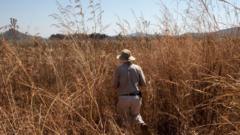**The Zimbabwean government has initiated compensation payments to former white farmers as part of a broader effort to rectify a historically contentious land reform program, raising hopes for economic recovery and diplomatic improvement.**
**Zimbabwe Begins Compensation to Former White Farmers Following Land Reforms**

**Zimbabwe Begins Compensation to Former White Farmers Following Land Reforms**
**Initial payments signal a potential thaw in Zimbabwe's economic relations with the West.**
Zimbabwe's government has embarked on a significant policy shift by announcing the first disbursement of funds to compensate white farmers whose lands were seized during the land reform initiative that transpired in the early 2000s. The government declared an initial payout of US$3 million (£2.3 million), which represents the first installment of a larger agreement reached in 2020 that committed the state to pay $3.5 billion (£2.6 billion) in total compensation for the confiscated farmland.
The controversial land seizures were originally aimed at rectifying injustices rooted in colonial land ownership, displacing thousands of white farmers, often through violent means. These actions, while intended to redistribute land to black Zimbabweans, had severe implications, leading to economic instability and estrangement from international allies.
The latest announcement by Finance Minister Mthuli Ncube details that these funds will initially cover compensation for 378 out of the total 740 approved farms, signifying only 1% of the allocated $311 million for this first phase. The subsequent payments will be processed via US-dollar denominated Treasury bonds, a move deemed necessary to stabilize the nation’s economy and to resolve financial arrears with former landowners.
Representatives for the involved farmers have indicated that interest in the compensation program has grown, although many former farmers are yet to accept the offer and continue to maintain their land title claims. The government has stipulated that compensation will solely cover improvements made to the land, with no reimbursements scheduled for the land itself, citing historical injustices from colonial ownership.
As part of ongoing negotiations to recover from decades of isolation, Zimbabwe recently began compensating foreign investors whose farms were previously protected by bilateral investment agreements. The country, which won independence in 1980, witnessed significant landownership disparities favoring a minority of white farmers, resulting in a complex socio-political landscape that has led to enduring economic challenges.
The state’s newfound approach under President Emmerson Mnangagwa, who assumed leadership after the ousting of Robert Mugabe in 2017, reflects a strategic intent to mend diplomatic ties with Western nations. Although Mnangagwa has asserted that land reform remains irreversible, he has acknowledged that compensation is vital for rebuilding relations with Western countries and improving Zimbabwe’s standing within the global financial system.
This compensation initiative is being interpreted by analysts as a critical step that may encourage renewed diplomatic engagement and ensure that Zimbabwe can navigate away from a looming threat of international judgments against its government.




















